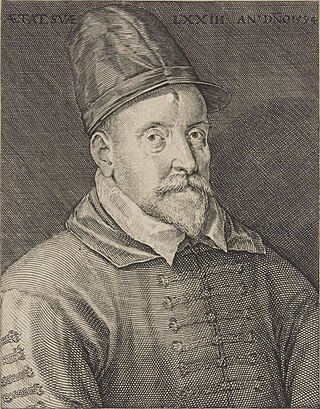
Stimmwerck was a male classical music vocal quartet ensemble specializing in the rediscovery and reproduction of the music of little known renaissance composers of the German-speaking world.

Stimmwerck was a male classical music vocal quartet ensemble specializing in the rediscovery and reproduction of the music of little known renaissance composers of the German-speaking world.
Stimmwerck was founded in Munich, Germany in 2001, by four specialists in classical vocal ensemble singing; the two tenors, Gerhard Hölzle and Klaus Wenk, bass singer Marcus Schmidl, and counter tenor Franz Vitzthum. Stimmwerck disbanded in 2019. [1]
Their name reflects the ensemble's structure and purpose. "Stimmwerck" comes from a 16th-century German term often used (for example, by Michael Praetorius) for a group of instruments of the same type but of different ranges, similar to the English term "consort of instruments". Thus, the ensemble was a “Stimmwerck” of classically trained male voices in varying ranges, attuned to one another in skill.
The focus of their work together was the bringing of forgotten or less well known renaissance composers of early music in the German-speaking regions once again into public recognition. To achieve this, they collaborated extensively with musicologists such as Ian Rumbold, Inga Mai Groote, and Katelijne Schiltz and actively engage in research. [2] [3] The results tok form as recordings, public performance in concerts, on tour and at early music festivals, and as their own 3-day annual festival in August, the Stimmwercktage, on the Adlersberg near Regensburg, Germany, which was broadcast each year by Bayerischer Rundfunk. [4] Stimmwercktage are being contiuned as Singer Pur Tage.
Stimmwerck recorded with Christophorus Records, Aeolus and Cavalli Records, among others, and had received praise for their work from the critical press. [5] Their first compact disks, with works by Heinrich Finck (1445–1527), and Adam of Fulda (1444–1505), each received the highest possible rating of 5 stars in “Goldberg Magazine”. [6]
Stimmwerck give concerts both in Germany and abroad. They have been featured guests at
Since 2005, the ensemble held an annual festival in early August named the “Stimmwercktage” (Stimmwerck Days) on the Adlersberg near Regensburg. There, using such modern technology as laptops and projectors in place of paper manuscripts, the works of a particular renaissance composer were the subject of German language lectures by musicologists and performances by Stimmwerck.
In previous years, works by the following composers were examined:
Antoine Brumel was a French composer. He was one of the first renowned French members of the Franco-Flemish school of the Renaissance, and, after Josquin des Prez, was one of the most influential composers of his generation.
Nicolas Gombert was a Franco-Flemish composer of the Renaissance. He was one of the most famous and influential composers between Josquin des Prez and Palestrina, and best represents the fully developed, complex polyphonic style of this period in music history.

Philippe de Monte, sometimes known as Philippus de Monte, was a Flemish composer of the late Renaissance active all over Europe. He was a member of the 3rd generation madrigalists and wrote more madrigals than any other composer of the time. Sources cite him as being "the best composer in the entire country, particularly in the new manner and musica reservata." Others compare his collections of music with that of other influential composers, such as Lassus.
Adam of Fulda was a German composer and music theorist of the second half of the 15th century. He was born in Fulda and died in Wittenberg.
Heinrich Finck was a German composer. He served as Kapellmeister first for Prince Alexander of Lithuania, later King of Poland, before living Poland in 1510. He worked in Stuttgart before becoming a member the Hofkapell.

Ludwig Senfl was a Swiss composer of the Renaissance, active in Germany. He was the most famous pupil of Heinrich Isaac, was music director to the court of Maximilian I, Holy Roman Emperor, and was an influential figure in the development of the Franco-Flemish polyphonic style in Germany. He and his teacher Isaac played an important role in the development of the German folksongs and their adoption as models for polyphonic compositions as well.
Hilliard Ensemble was a British male vocal quartet originally devoted to the performance of early music. The group was named after the Elizabethan miniaturist painter Nicholas Hilliard. Founded in 1974, the group disbanded in 2014.
František Xaver Brixi was a Czech classical composer of the 18th century. His first name is sometimes given by reference works in its Germanic form, Franz.

Saint Emmeram's Abbey was a Benedictine monastery founded around 739 at Regensburg in Bavaria at the grave of the itinerant Frankish bishop Saint Emmeram. The original abbey church is now a parish church named St. Emmeram's Basilica. The other buildings on the site form a large complex known as Schloss Thurn und Taxis or Schloss St. Emmeram, which has served as the main residence of the Thurn und Taxis princely family since the early 19th century.
The decade of the 1510s in music involved some significant events.
Philipp Dulichius was a German composer.
Huelgas Ensemble is a Belgian early music group formed by the Flemish conductor Paul Van Nevel in 1971. The group's performance and extensive discography focuses on Renaissance polyphony. The name of the ensemble refers to a manuscript of polyphonic music, the Codex Las Huelgas.
The Johann Rosenmüller Ensemble is a German early music group formed by the German cornetto player and conductor Arno Paduch in 1995. The group's performance and discography focuses on the rediscovery of unknown music of the 17th and 18th centuries.
The Ensemble Clément Janequin is a French early music ensemble founded in 1978 and specializing in the chansons of the Renaissance and early Baroque.
Manfred Cordes is a German conductor of early music, musicologist and teacher. He is professor at the Hochschule für Künste Bremen and was its rector from 2007 to 2012.

Schola Antiqua is a professional American early music ensemble based in Chicago, Illinois. The group specializes in pre-modern vocal music and is the 2012 winner of the Noah Greenberg Award from the American Musicological Society, an award that recognizes "outstanding contributions to historical performing practices." In 2006 and 2007, Schola Antiqua served as Artist in Residence at the University of Chicago, and the group currently holds an artistic residency at the Lumen Christi Institute. Schola Antiqua of Chicago performs mainly in Chicago but has also presented concerts around the United States and internationally. The choir is under the artistic direction of Michael Alan Anderson from the Eastman School of Music.

Arthur Maud is an Anglo-American composer, conductor, and musicologist.
Collegium Vocale Bydgoszcz is a Polish vocal quartet founded in 1992.The band was founded on the initiative of Roman Fijałkowski a baritone soloist of the band Madrigalists Capella Bydgostiensis. The first line-up of this vocal quartet: Roman Fijałkowski - baritone, Michał Zieliński - tenor. Janusz Cabała-countertenor, Hanna Michalak - soprano. Its repertoire includes polyphonic mass settings, motets, religious songs, madrigals and secular songs by European 13th to 17th century composers. The ensemble has cooperated with other Polish early music ensembles including Ars Nova, Capella Bydgostiensis, The Pomeranian String Quartet, Trombastic, Canor Anticus as well as with lutenists Magdalena Tomsińska and Henryk Kasperczak. The ensemble has participated in early music festivals of Poland as well as abroad in Germany, Denmark, Sweden, Belarus and Italy. The ensemble has made numerous recordings both for Polish Radio and Polish Television.

Cinquecento is a Vienna based vocal ensemble formed in 2004 comprising five singers from Austria, Belgium, England, Germany and Switzerland.
Miriam Feuersinger is an Austrian soprano.